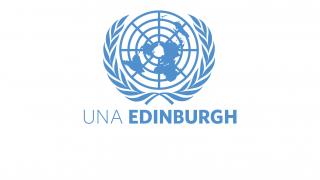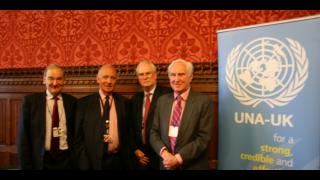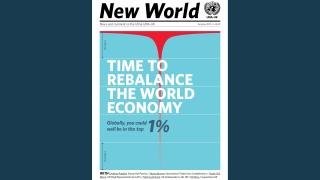
As the global financial crisis of 2008–09 unfolded, it caused a ripple effect across the financial capitals of the world’s most advanced economies. This saw the collapse of large financial institutions, the bailout of banks by national governments and the plummeting of stocks around the world. In the immediate aftermath of the crisis, economists were quick to point out that, due to their isolation and lack of integration in global markets, as well as improved macroeconomic policies, the 48 least developed countries (LDCs) would emerge relatively unscathed in the initial phases of the ensuing global slowdown.
But with the deepening of the financial crisis and the subsequent austerity measures imposed by governments worldwide, LDCs find themselves increasingly confronted with the very real effects of the financial crisis. The delayed negative impact has proven especially harsh on these economies, given the uptick in growth that several of them had experienced over the last decade.
Prior to the financial fallout, LDCs showed improved economic performance. Real GDP growth had surpassed the 7% target set by the Brussels Programme of Action – a partnership framework established in 2001 with the aim of accelerating development in LDCs – up from less than 4% during the 1990s. Then, in 2009, GDP growth dropped to 4.5%.
The reduction in growth was particularly sharp for small-island LDCs, which rely heavily on tourism – one of the sectors most affected by the crisis. The downturn in international trade, meanwhile, has hit hard across the board. Asian manufacturing exporters, for instance, have experienced decline as a result of reduced demand in their main export markets. Foreign direct-investment flows, which reached their highest level in 2007, have also been declining rapidly since the onset of the financial crisis, affecting oil- and mineral-exporting LDCs in particular. The drop-off in migrant workers’ remittances is of equal concern.
The impact of the global economic crisis on LDCs is not only multi-faceted; it will also affect different countries in different ways, depending on the mode of integration of a particular LDC into the global economy and the structure of its domestic economy.
Despite measures agreed by these countries and their development partners to tackle these challenges, LDCs still suffer from a number of structural constraints that militate against their sustained growth, development and structural transformation, all of which are critical to poverty reduction. Weak productive capacities and limited diversification, as well underdeveloped agricultural sectors, are some of the impediments to LDCs’ long-term development, rendering them vulnerable to external shocks.
Similarly, LDCs continue to struggle with improving human and social development. Some, including those emerging from conflict, lack adequate governance capacities and institutions.
In addition, new challenges have emerged, including volatile energy and food prices, and ongoing concerns over food security, as well as the growing impacts of climate change and the loss of biodiversity. All of these have increased vulnerabilities and inequalities within LDCs, and have adversely affected development gains in these countries.
The way forward
Yet, despite what may appear as a hopeless situation for these nations, we at the UN Office for the Least Developed Countries, Landlocked Developing Countries and Small Island Developing States (OHRLLS), and our partners, remain ever positive that, with continued support and commitment, the situation in LDCs can be remedied. The Fourth UN Conference on LDCs, which took place in 2011 in Istanbul, resulted in the adoption of a bold political declaration and a comprehensive and ambitious programme of action. Its overarching goal is to address the structural handicaps of LDCs in order to secure poverty eradication and the attainment of internationally agreed development goals across all LDCs.
The declaration calls for a shift in the development paradigm, with a rebalancing of priorities between the productive sectors and social sectors, as well as balanced roles for the state and the market. Thus, the first priority area of the programme of action is bolstering productive capacity, including basic infrastructure, energy and transfer of technology and know-how, in order to bring about much-needed structural transformation. It has in its sights the ultimate goal of increasing decent employment,which is essential to ensuring that a reduction in poverty is sustainable. The implementation of agreed measures in this area is crucial for LDCs to benefit from higher commodity prices in the medium term, especially in the agricultural sector, which dominates most LDC economies.
In Istanbul, UN member states also called for an expansion in, and the broadening of, partnerships for LDCs, not only with development partners and countries in the South but also with non-traditional players, specifically parliaments, civil society organisations and the private sector.
There is no room for complacency. More than 75% of people in LDCs live in poverty and it is a matter of deep concern to the international community that only three countries (Botswana, Cape Verde and the Maldives) have graduated out of this category in the past three decades. Solidarity, cooperation and partnerships with LDCs – the poorest and most vulnerable countries – and their people are not only moral imperatives; they are also economic, security and political ones.
We should never lose sight of the fact that LDCs represent an enormous human and natural resource potential for world economic growth, welfare and food and energy security.
A successful, renewed and strengthened global partnership that effectively addresses the special needs of LDCs will ultimately contribute to the cause of peace, prosperity and sustainable development for all.
Cheick Sidi Diarra is UN Under-Secretary-General and High Representative for the Least Developed Countries, Landlocked Developing Countries and Small Island Developing States. In 2011 he served as the Secretary-General of the Fourth United Nations Conference on the Least Developed Countries, which took place in Istanbul, Turkey
To learn more about the work of the Office of the Under-Secretary-General and High Representative, please visit www.un.org/ohrlls













